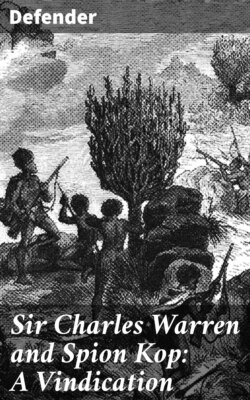Читать книгу Sir Charles Warren and Spion Kop: A Vindication - Defender - Страница 9
На сайте Литреса книга снята с продажи.
DOVER, SHOEBURYNESS, AND THE ORDNANCE
FACTORIES, 1871 TO 1876
ОглавлениеTable of Contents
In 1871 Warren returned to military duty, and was posted to Dover in command of the 10th Company of Royal Engineers, and for the next year was employed on the fortifications of the fortress, principally at Dover Castle and Castle Hill and Fort (Fort Burgoyne). He was then transferred, in 1872, to the School of Gunnery at Shoeburyness, where he remained for three years, and was very successful in his administration of the Engineer duties in regard both to the barracks and the experiments with big guns and iron plates carried out by the Ordnance Committee. He had also Engineer charge of the gunpowder magazine at Purfleet.
On his departure, in 1875, to take Engineer charge of the Gunpowder and Small-arm Factories at Waltham Abbey and Enfield, he received the highest commendation from the Commandant of the School of Gunnery, who wrote to the War Office that Captain Warren’s professional reputation as a highly instructed and accomplished officer was so well established that it was unnecessary to refer to it, beyond stating that the station had benefited largely by his administration in carrying out the important duties entrusted to him, and that he placed on record not only the support and assistance received from him in all official matters, but that his social relations with the Commandant and all other officers of the establishment rendered his departure a subject of sincere regret to all.
He was a candidate in 1876 for the secretaryship of the Royal Engineers’ Institute, when Colonel (afterwards Sir) Peter Scratchley observed in his recommendation: ‘Captain Warren has been under my command for four and a half years, and is, in my opinion, a most able, conscientious, indefatigable officer, and one who would do credit to the Corps wherever employed. His literary tastes, general experience, and qualifications particularly fit him for the appointment he is desirous of obtaining.’
Although unsuccessful his services were to be utilised in a wider sphere than his own Corps.
In October 1876 he was asked by the Colonial Office to undertake the duty of laying down the boundary line between Griqualand West and the Orange Free State, and his services were at once lent by the War Department. On leaving England he received a letter from Lord Carnarvon’s private secretary saying how much the Colony was to be congratulated on having obtained his services, and another from his late chief, Colonel Scratchley, regretting his departure and expressing his belief that he ‘would never meet an abler officer or a better fellow.’
